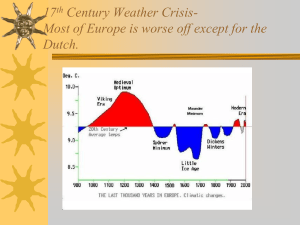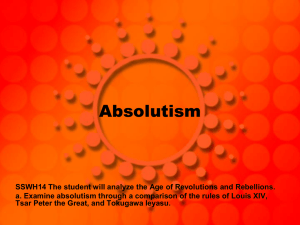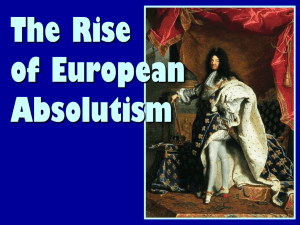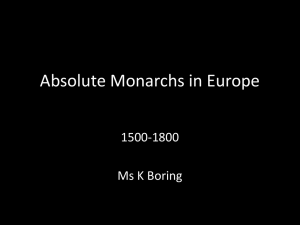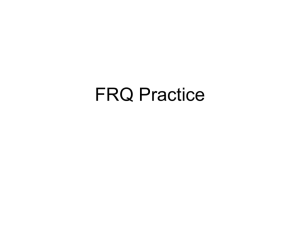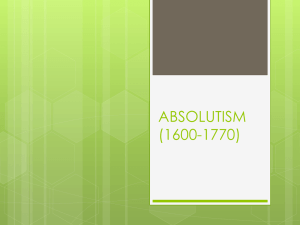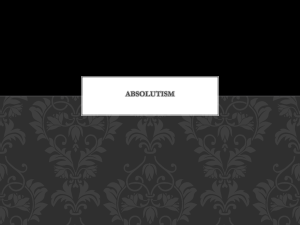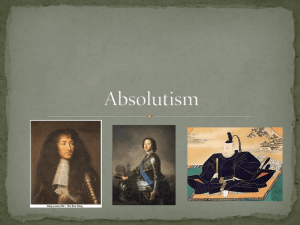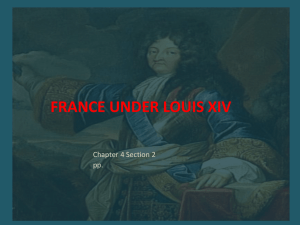The Rise of Absolutism - Mrs. Silverman: Social Studies
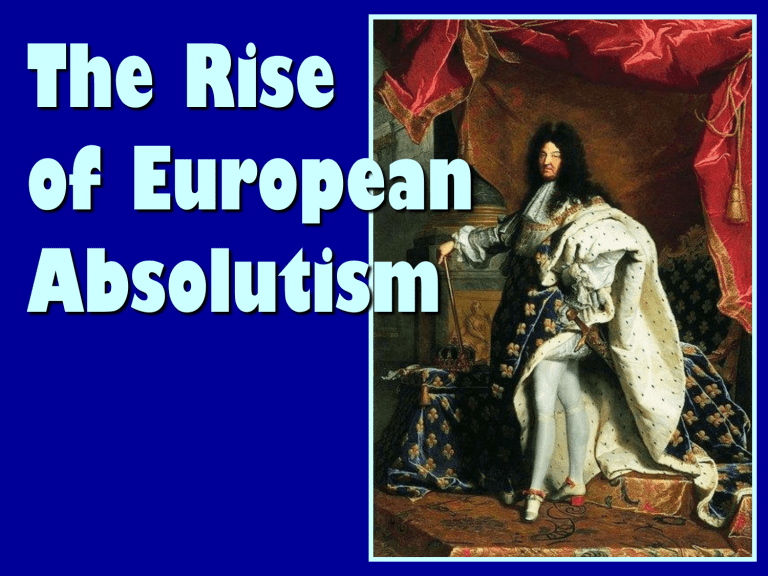
The Rise of European
Absolutism
What is Absolutism?
• Absolutism:
• A form of government in which all power is vested in a single ruler or authority
The Divine Right of Kings
• The belief that God granted monarchs with the power to rule
• Therefore, the king was answerable
ONLY to God
Why Did Absolutism Develop?
• Long-Term Causes of Absolutism:
• The rise of cities & the support of the middle class
• The growth of national kingdoms
• Loss of Church authority
• Decline of feudalism
Why did Absolutism Develop?
• Immediate Causes of Absolutism:
• Religious and territorial conflicts created fear and uncertainty
• The growth of national armies to deal with conflicts caused rulers to raise taxes to pay troops
• Heavy taxes led to additional unrest & peasant revolts
Long-Term Causes Immediate Causes
ABSOLUTE RULER
Immediate Effects Long-Term Effects
THINK ABOUT IT…
• If our classroom were a country and you wanted to be the absolute ruler of it, what steps would you need to take?
Effects of Absolutism
• Immediate Effects of Absolutism:
• Regulation of religion & society
• Rulers create bureaucracies to control their countries’ economies
• Loss of power by nobility & legislatures
• Larger courts & huge building projects to demonstrate power
Effects of Absolutism
• Long-Term Effects of Absolutism:
• Western influence on Russia
• English political reforms influence U.S. democracy
• Revolution in France
After the Age of Exploration, FIVE European countries emerged and began to dominate
Europe…
ENGLAND
FRANCE
AUSTRIA
PRUSSIA
RUSSIA
PREDICT:
Which of the 5 emerging powers will be the strongest during the Age of
Absolutism?
Russian Absolutism
Ivan the Terrible
Oprichniki
• Established by Ivan the
Terrible
• Russian secret police force
• Terrorized the Russian people
Boyar Policy
• Boyars:
• Russian nobles
• Ivan reduced nobles’ power
• Seized their land and placed it under his control
Peter the Great
Peter the Great
• Forced the Russian nobility to adopt western customs
• EXAMPLES:
• Clothing & Hair Styles (beards!)
• Women & parties
• Eating potatoes
• Building with stone
Saint Petersburg
• Built a new
Russian capital
• “Window to the West ”
• Nobles were required to have a house in
Saint Petersburg
Territorial Expansion
• Expanded & modernized the army
• Hired European officers to train soldiers with weapons & tactics
• Took territory from Sweden
• Gave Russia access to the sea
Noble Taxation
• Russian nobles paid NO taxes
• Burden fell on the poor in
Russia
Economic Reforms
• Brought agriculture & craft production under strict government control
• Encouraged better trade
& manufacturing
Religion
• Brought the Russian Orthodox Church under state control
• Created the
Holy Synod to run the Church under his direction
MEME Peter the Great
(hint: he’s the one with the scissors) or the boyar
This is a hairy situation!
The
German
States
The Thirty Years War
• Religious conflict in the Holy Roman
Empire (Germany)
• Protestant States v. Catholic States
• The Peace of Westphalia ends the war
• Divides the Holy Roman Empire into 30+ kingdoms
The Thirty Years War
Austria
• The Hapsburg family of Austria sets up a strong monarchy
• Most famous monarch – Maria
Theresa (1740)
Prussia
• Very militaristic kingdom
• Becomes the most powerful of the German states
• The heart of modern-day
Germany
Absolutism in France
What’s Been Going on in France?
• Series of religious wars between Catholics
& Protestants
• Henry IV issued Edict of Nantes
– a declaration of religious toleration
– granted Huguenots – French Protestants - the right to worship in areas where they were a majority
– Ended religious strife in France
Louis XIII
& Cardinal
Richelieu
Cardinal Richelieu
• Appointed as a minister
(under Louis XIII – weak king!)
& became, in effect, the ruler of France
• Took steps to weaken the nobility & increase the power of the monarchy
Cardinal Richelieu
• Established Intendants: Local administrators who represented the monarchy
– Came from the middle class
– Appointed & removed by the king
• How would this weaken the nobility & increase the power of the king?
Louis XIV:
The Sun
King
Absolute Rule
• The most famous ruler in French history
• 72 year reign (1643-1715)
• Source of ALL political authority in France
• “L’etat, c’est moi”
• “I am the state”
Absolute Rule - Nobles
• Nobles were exempt from paying most taxes
• Helped the king gain loyalty while reducing the power of the nobles
Absolute Rule - Culture
• Made opera & ballet more popular
• Chief purpose of art was to glorify the king and support his absolute rule
Absolute Rule - Religion
• Louis XIV repealed the Edict of Nantes in
1865
• Ended religious toleration for Protestants
• All Frenchmen under the control of the Catholic
Church (& the king!)
Absolute Rule - Economy
• Practiced mercantilism
• Encouraged colonization of
Canada to increase trade & wealth
Louis’s
Grand Style
Versailles
• Louis XIV spent a fortune to satisfy his tastes
• Built a splendid palace at Versailles & moved court there
• Having the nobles at the palace decreased their power & increased royal authority
Versailles
• It made the nobility totally dependent on Louis
• It took them from their land , giving more power to the king
• The elaborate style & rich decoration of
Versailles impressed the king’s subjects & gained the admiration & envy of foreign monarchs
Versailles
Controlling the Nobles at
Versailles
• Nobles hoped to be favorable in the eyes of the king; having the nobility at Versailles increased royal authority by keeping nobles away from their homes and making them dependent on the king
• Marks of royal attention determined whether a noble succeeded or failed at Versailles
• Louis awoke at 7:30 am and had 100 nobles there to help him dress
• Only 4 nobles were given the honor of holding his slippers or sleeves
• Lesser nobles waited outside hoping for acknowledgement from Louis
Customs at the Palace
etiquette, dress, and behavior for nobles at Versailles
• Over 1.000 nobles with their 4.000 servants lived at Versailles; being away from court was a big no-no
• Louis also had 5.000 personal
Versailles
• Performing duties such as wiping
Some rules to follow…
• You could not knock on the king’s door; you had to use your left pinkie finger to gently scratch on the door and await permission to enter; as a result the pinkie fingernail was often grown longer than the others
• There was a specific way that a man must sit down in a chair; sit down too fast and tight pants might split
• Women and men were not allowed to cross their legs in public
Louis’s Wars
• Under Louis XIV
France was the most powerful nation in
Europe
• Fought wars to expand territory
Louis’s Wars
• The War of Spanish
Succession (1701-1713)
– Fought over who would acquire the Spanish throne
– Long struggle between Britain , Austria,
Dutch Republic, Portugal, German States &
Italian States v. France & Spain
• War drains French treasury , increases poverty & opposition to Louis’s rule
Conclusion:
• How did absolute rulers in both Russia and
France bolster their authority and power?
Both Russia and France…
• Built strong armies
• Expanded territory
• Created a strong centralized power
• Brought nobility under control (no taxes)
• Encouraged building, manufacturing, and trade
• Brought church under gov’t control
• Did not allow religious toleration

